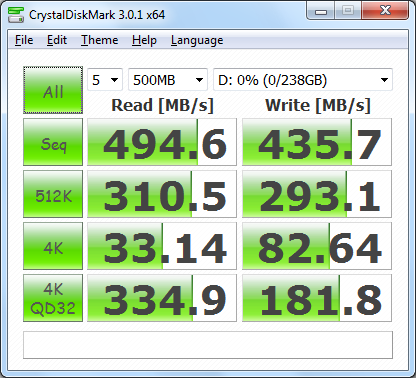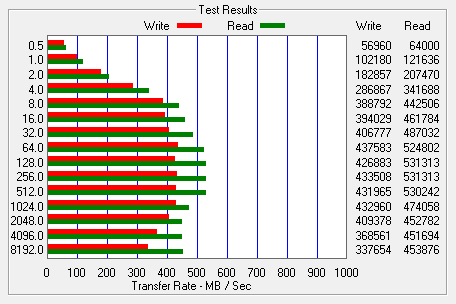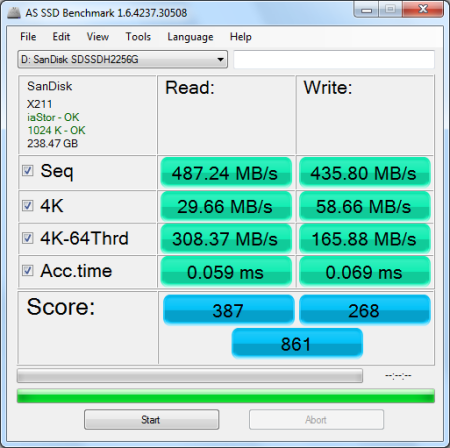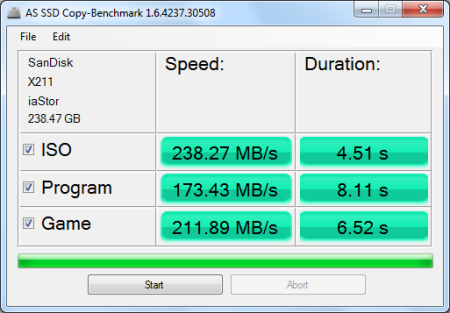![]()
![]()
Model: Silicon Power Slim S55 240GB Solid State Drive
Manufacturer: Silicon Power
Provided By: Silicon Power
Silicon Power is a relatively new name in the storage industry. Founded in 2003 by a group of professionals specializing in international business, global marketing and technical engineering, the company has already established itself as one of Taiwan's top manufacturers. With an eye for attractive and versatile design, Silicon Power has built its brand around the concept that its customers deserve products that represent who they are in life and mirror their personality. The end result is a variety of uniquely designed storage products including USB flash drives, memory cards and solid-state drives (SSD).
This spring, Silicon Power launched two new budget friendly SSDs, the Velox V55 and Slim S55. Designed for the cost-conscious consumer looking to upgrade their system to a SSD, the V55 and S55 are powered by Phison's PS3108-S8 processor and feature a SATA 6GB/s interface, TRIM support and a 512MB cache. Both drives are also equipped with up to 480GB of MLC NAND flash to deliver up to 556 MB/s read and 500 MB/s write speeds. The only real difference between the two drives is the form factor. Where the V55 is 9mm thick and can be installed in a desktop or standard notebook PC, the 7mm thick S55 is perfect for ultrabooks or ultra-slim notebooks.
For this review, Silicon Power sent us the 240GB version of the Slim S55. This SSD is capable of delivering up to 556 MB/s sequential read and 480 MB/s sequential write speeds as well as a maximum of 80,000 4K random write IOPS.
| Silicon Power Slim S55 240GB Solid State Drive | |||||||||||||||||||||||||||
General Specifications
Performance
Environmental
Dimensions and Weight
Other Features
|
Needless to say, this is only a taste of what the Slim S55 has to offer. To give you an idea of what to expect, we'll take a closer look at Silicon Power's new SSD and then see how well it performs. Does the S55 have what it takes? Can it deliver the value and performance we've come to expect from Silicon Power? Keep reading as we find out.
The Slim S55 comes in a brightly colored box. Along with a picture of the drive, the front advertises many of its key features including its 240GB capacity, SATA III interface and 7mm ultra-slim form factor. The back of the box provides a bit more information, including the S55's specifications and a longer list of features. Inside, you'll find the SSD, mounting screws and a small installation guide.
![]()
Physical Features:
Like Silicon Power's other SSDs, the Slim S55 is very well constructed. The outer casing is made entirely out of metal and is covered by a nice, matte black finish. The top of the drive also has a large, black and rainbow hued sticker advertising its capacity as well as the fact that it is part of Silicon Power's Slim S55 series.
![]()
![]()
The biggest difference between the Slim S55 and the Velox V55 is the height of the two drives. Where the V55 is your standard 2.5" SSD with a height of 9.5mm, the S55 sports an ultra-slim form factor. At 7mm in height, the drive can be installed in ultrabooks as well as standard laptops and desktop PCs.
![]()
Like Silicon Power's Velox V55, the S55 uses Phison's PS3108 controller. The PS3108 can be found in a handful of other SSDs including the Corsair Force LS, MyDigitalSSD BP4, PQI S510 and Silicon Power's own Velox V55.
![]()
![]()
Silicon Power is a big vague as to what type of NAND the Slim S55 is equipped with. Looking at the pictures above, you can see that the 240GB version of the drive has sixteen 16GB TT57G2GAHC MLC NAND flash chips. The part number doesn't match exactly, but, from what I can gather, this is Toshiba manufactured NAND that was relabeled by Phison. The S55 also has a single 512MB PSC A3P4GF4BLF DDR3 DRAM memory chip that is used for caching.
The test system used in this review was an HP 8200 Elite. The computer came equipped with an Intel Core i5-2400 CPU, 4GB of DDR3 1333MHz memory, Seagate Barracuda 7200.12 ST3250312AS 250GB SATA 6 Gb/s hard drive, NVIDIA Quadro FX580 512MB PCIe graphics card and an Intel 82579-LM gigabit network card. For the operating system, I installed a fresh copy of Windows 7 Enterprise.
To test the performance of Silicon Power S55, I ran a series of benchmarks using CrystalDiskMark 3.0.1, HD Tach RW 3.0.4.0, ATTO Disk Benchmark 2.46, AS SSD, HD Tune Pro 4.61, Anvil's Storage Utilities and Iometer. For comparison, I've also included test results from the Samsung SSD 840 EVO, Seagate SSD 600, SanDisk Extreme II, OCZ Vector, Plextor PX-256M5Pro Xtreme, Samsung SSD 840 Pro, Samsung SSD 840, Kingston Ultra Plus, OCZ Vertex 4, OCZ Agility 4, Kingston SSDNow V300 and Kingston HyperX 3K.
![]()
As I mentioned earlier, the S55 is based on Phison's PS3108 controller. Looking at the screenshot above, you can see that it performs equally well when reading incompressible (0%) and compressible (100%) data. For whatever reason though, the write speed slowly decreases as the level of compression increases.
CrystalDiskMark 3.0.1:
First, I ran a few quick tests using CrystalDiskMark. This benchmark tool measures the performance of a storage device by testing its sequential read and write speeds as well as its random read and write speeds using blocks 512K and 4K in size.
According to Silicon Power, the 240GB S55 is capable of reading at 480MB/s and writing at 360MB/s when tested with CrystalDiskMark. As you can see, the drive had no problems exceeding these numbers when using random (default) test data.
The Slim S55 performed even better when using highly compressible 0x00 (0 Fill) data. This time around, the drive was able to read at 512.0 MB/s and write at 472.1 MB/s.
HD Tach RW 3.0.4.0:
Next, I used HD Tach to test the S55's read, write and burst speeds as well as its seek times and CPU usage.
![]()
Looking at the screenshot above, you can see that the S55 had average read and write speeds of 438.3 MB/s and 327.3 MB/s respectively, as well as a burst speed of 349.4 MB/s.
ATTO Disk Benchmark 2.46:
I also used ATTO Disk Benchmark to test the S55's sequential read and write speeds. The tests are run using blocks ranging in size from 0.5KB to 8192KB and the total length set to 256MB.
When tested with ATTO, the S55's read speeds topped out at about 556 MB/s and its write speeds at 510 MB/s.
AS SSD:
AS SSD is a relatively new benchmark designed specifically for solid state drives. The application contains five synthetic tests used to determine the sequential and random read and write performance of a drive.
AS SSD also includes a copy benchmark. This test copies an ISO (two large files), program (many small files) and game (small and large files), returning the speed and duration of each.
HD Tune Pro 4.61:
Next, I ran a series of tests using HD Tune Pro. This hard disk utility measures a drive's performance by testing its sequential read and write speeds as well as its access time, burst rate and CPU usage. For this review, I'm also going to use it to benchmark the S55's random read and write speeds, random access times and the number of operations per second.
Silicon Power S55 240GB - HD Tune Read Benchmark |
 SanDisk Ultra Plus SSD 256GB - HD Tune Read Benchmark |
Silicon Power S55 240GB - HD Tune Write Benchmark |
 SanDisk Ultra Plus SSD 256GB - HD Tune Write Benchmark |
The S55 performed relatively well when benchmarked with HD Tune. The drive had average read and write speeds of 506.5 MB/s and 356.7 MB/s, respectively, as well as a burst rate of 168.1 MB/s when reading.
Silicon Power S55 240GB - HD Tune Random Access Read |
 SanDisk Ultra Plus SSD 256GB - HD Tune Random Access Read |
Silicon Power S55 240GB - HD Tune Random Access Write |
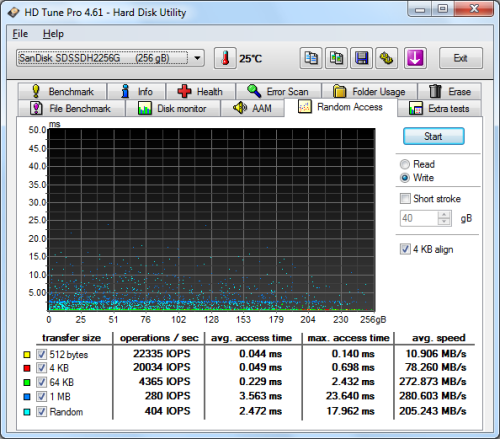 SanDisk Ultra Plus SSD 256GB - HD Tune Random Access Write |
The S55 didn't disappoint when doing random reads and writes. When reading 4KB blocks, the drive reached 16,568 IOPS and had an average speed of 64.721 MB/s. The S55 was even faster when writing, reaching 21,321 IOPS with an average speed of 83.289 MB/s.
Anvil's Storage Utilities:
Anvil's Storage Utilities is another new benchmark designed with SSDs in mind. The standard storage benchmark measures a drive's performance by testing its transfer speeds, access times and IOPS.
![]()
Silicon Power S55 240GB - Incompressible Data
![]()
Silicon Power S55 240GB - Compressible Data
Iometer:
Lastly, I ran a series of tests using Iometer. This tool can be configured to benchmark a number of things. In this case, I used it to measure the S55's read and write speeds and the number of operations per second. The tests were run using random bytes and a queue depth of 3.
![]()
The S55's performance was very similar to what we saw in our other tests. The drive was able to read at 488.12 MB/s and write at 362.4 MB/s.
![]()
The S55 wasn't one of the faster drives we've tested when it came to random reads and writes. In our tests, the drive was able to read at 114.49 MB/s and write at a 224.79 MB/s.
![]()
According to Silicon Power, the 240GB S55 is capable of up to 80,000 IOPS when writing 4K blocks. In our tests, the drive reached 29,309 random read IOPS and 57,545 random write IOPS. Increasing the queue depth had little impact on the S55's random write performance. However, with the queue depth set to 32, the drive was able to reach 37,391 random read IOPS.
TRIM Performance:
While SSDs offer many benefits, there are some downsides to using flash memory. One of the biggest issues people run into is performance degradation. Over time, an SSD will run out of fresh blocks and will have to write over data the file system has marked as deleted. This procedure is very complicated and can slow an SSD's write speeds considerably.
To address this problem, most manufacturers have added TRIM support to their SSDs. The TRIM command allows an operating system, such as Windows 7, to tell an SSD which data blocks are no longer in use. Using this information, the drive proactively erases these blocks and adds them to the free block pool.
![]()
To test the S55's TRIM function, I first put the drive in a "dirty" state. I used Iometer to fill the entire drive and then ran a random write test for about 30 minutes. This had very little effect on the S55's read speed. However, its average write speed dropped to 73.9 MB/s.
![]()
Silicon Power S55 240GB - Dirty
To see how well the S55 could recover, I let the computer sit for a couple of hours and then reran the test. The drive wasn't able to reach the factory fresh performance shown in our earlier tests. However, its average write speed climbed up to 233.1 MB/s.
![]()
Silicon Power S55 240GB - After Trim
Lastly, I used Parted Magic to perform a secure erase on the S55. With the drive wiped clean, its write speed jumped back up to 294.2 MB/s.
![]()
Silicon Power S55 240GB - Secure Erase
Final Thoughts:
Silicon Power's new Slim S55 SSD is a great choice for the cost-conscious consumer looking to improve the performance of their existing desktop, notebook or tablet computer. Powered by Phison's PS3108 controller, this ultra-slim drive combines MLC NAND flash with a sizeable DRAM cache to deliver a fast and responsive computing experience. In our sequential read and write tests, the S55 was able to read at speeds as high as 556 MB/s and write at speeds in excess of 360 MB/s. It also did relatively well in our random write tests, producing more than 57,000 IOPS at low queue depths. Given, these numbers aren't nearly as high as what we saw with Silicon Power's Slim S70 SSD, but the S55 is still a huge step up over traditional hard drives.
While the Velox V55 is available at Amazon, I could not find the Slim S55 in stock at any of the major US retailers. If the S55 is priced similarly, the 120GB drive should run about $70 with the 240GB version reviewed here going for as little as $100 when it finally ships.

Highs:
- Available in 60GB, 120GB, 240GB and 480GB capacities
- Slim 7mm form factor
- Phison PS3108-S8 controller
- Good sequential and random read and write performance
- SATA 6Gb/s interface
- Supports SMART, TRIM and Garbage Collection
- Well constructed design
- Reasonably priced
- 3 year warranty
Lows:
- Not as fast when writing incompressible data
- Hard to find in some markets


